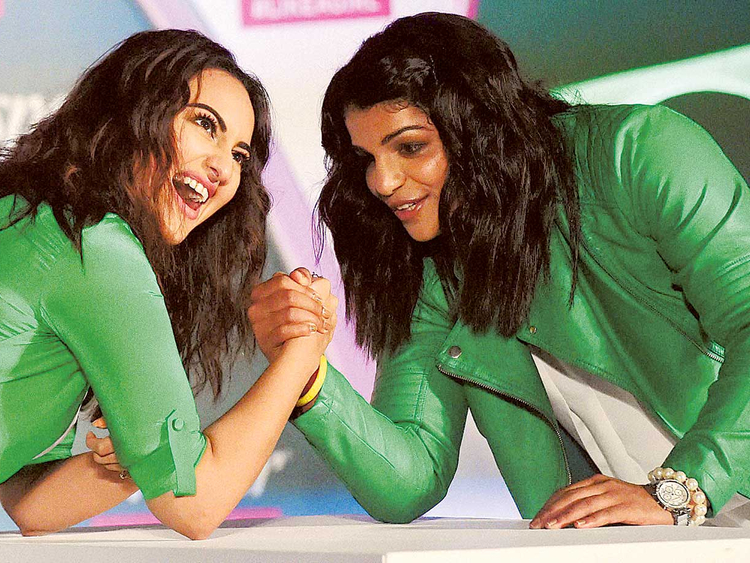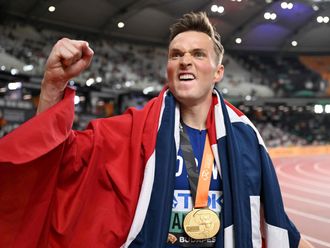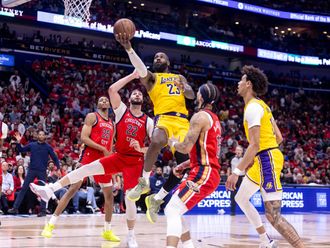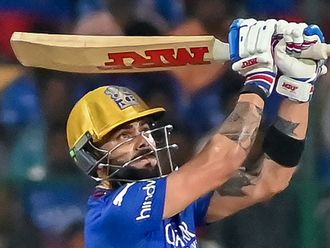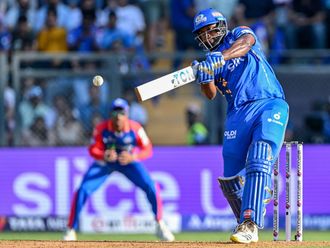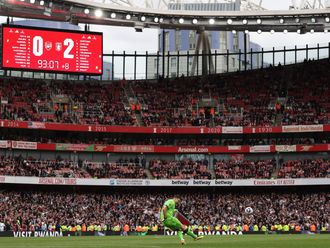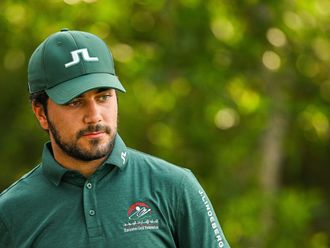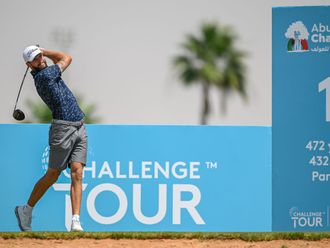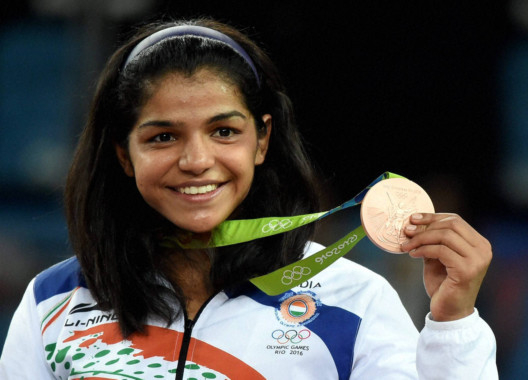
Abu Dhabi: With minutes remaining of her bronze-medal wrestling match, Sakshi Malik had been hurtling towards more bitter frustration for India at the 2016 Rio Olympics in August.
The 24-year-old was trailing Kyrgyzstan’s reigning Asian champion Aisuluu Tynybekova 5-0 in the 58kg category bout, an impending fourth-place finish set to continue her country’s depressing medal drought.
But while the likes of the eminent duo of Saina Nehwal and Leander Paes, both medallists at previous Games, had dismally failed to fulfil expectations, Malik dramatically delivered.
After drawing level with her opponent, and with just seconds remaining, Malik snatched victory from the jaws of defeat with a do-or-die, three-point move to triumph 8-5 and clinch a bronze medal. “In the final moments of the bout, I was down by five points and I knew I had to go for it,” she tells Gulf News in an exclusive interview. “The following few minutes were the best of my life.”
“Winning an Olympic medal has always been a dream of mine, ever since I was a child,” adds Malik, who took up wrestling at the age of 12 in the village of Mokhra in the northern Indian state of Haryana. “I have always worked hard and tirelessly to achieve my goal. Even though I’ve always thought about it, it was a surreal experience.”
This was vital redemption for India. They had sent their largest team of 117 athletes to the Games, 34 more than London 2012, where they plundered a record six medals.
But Malik — and then two days later PV Sindhu, who claimed women’s badminton silver — spared a nation from unmitigated disaster and sent a billion people into unfettered ecstasy.
Furthermore, Malik became the first Indian woman wrestler to win an Olympic medal and only the fourth female from India to achieve the feat along with Sindhu, Nehwal and the boxer Mary Kom. “I am just proud to have won a medal for my country,” says the 5ft 4ins grappler, who painted her nails with the Indian flag and the Olympic rings. “Breaking records and making history are all secondary to me.”
Lot has changed
Unsurprisingly, Malik received a rapturous reception on returning home and has since attended a dizzying number of celebratory functions. “Most people didn’t know who I was before the Olympics; a lot has changed for me since I’ve returned. People have showered me with love and adoration.”
Among those who have feted her have been legendary figures such as Sachin Tendulkar and Amitabh Bachchan.
And the coup de grace came when the Indian President, Pranab Mukherjee, bestowed her, Sindhu and the gymnast, Dipa Karmakar, who finished fourth at the Games, with India’s highest sporting honour, the Rajiv Gandhi Khel Ratna Award.
“Meeting Sachin Sir [Tendulkar] and so many other great people has been a pleasant experience,” she recalls, with heavy understatement. “Receiving the Khel Ratna Award was a moment of pride for me and going back to my college [to be honoured there] made me feel very nostalgic.”
Malik’s fame could yet grow further given that the Bollywood actress, Sonakshi Sinha, has suggested doing a biopic about her. “It is very exciting and I would love to see a biopic done about me,” says Malik, who began her international career with 2014 Commonwealth Games silver. “I generally don’t watch too many movies, so it’s okay even if it doesn’t happen.”
While Malik appreciates her new-found recognition, her lifeblood remains her primary focus. “I want to return to my training as soon as possible; I miss being on the mat,” she says. “My next major tournament will be the senior nationals and then the upcoming wrestling league.”
What about the next Olympics in Tokyo in 2020?
“I will work hard and do everything I can to make it to Tokyo and win a medal again for my country,” Malik replies emphatically.
But she is also fuelled by a philanthropic goal — that of being a role model to other aspiring Indian sportswomen given her empowering triumph over adversity.
Deciding to pursue a traditionally male sport, given her admiration for her wrestler grandfather Badlu Ram, was controversial enough and bound to provoke scorn from the unenlightened.
Boy’s sport
But in her homeland, this was compounded by the fact that many sporting bodies remain overwhelmingly sexist, and their opposition to women in sport is endorsed by male-dominated ‘khap panchayats’ (village councils).
These are caste and clan groups that have tried to ban mobile phones for women to quell interaction with the opposite sex, impose dress codes for women and even advocate honour killings to protect local culture. “People have always taunted me saying, ‘It’s a boy’s sport’,” Malik reflects.
“But it never affected me negatively; it just made me more determined. Changing people’s mindsets about what a girl should do and not do has been my biggest challenge.”
Haryana is also notorious for female foeticide, given a deeply entrenched cultural preference for boys.
But the state’s government is eager to eradicate this perception by making Malik the face of its ‘Beti Bachao’, or ‘Save the daughters’, campaign.
“It is a great honour being named the brand ambassador of such a campaign, but it is also puts a lot of pressure on me,” Malik says of the initiative aimed at increasing the efficiency of women’s welfare services. “It is a great opportunity for me to help girls with everything I can and do something for the women of our country.
“I want to encourage more women to do what they want to do. I want to tell them that if they have a dream, they should have faith in themselves and hard work always pays off at the end.
“Being a woman in a man’s sport makes the battle to prove oneself even harder for female athletes.”
Thankfully, Malik is not alone in her mission as she is among more than 30 women wrestlers from Haryana who have represented India at international level.
And at least five new girls a week have reportedly joined Malik’s government-run Chotu Ram Stadium Wrestling Academy since her Olympic heroics.
A far cry from the dark days of 2002, then, when the academy’s former head coach, Ishwar Singh Dahiya, faced fierce resistance from community leaders when he first admitted girls to an all-boys’ club.
“People said don’t mix goats with lions,” he is quoted as saying about the furious reaction his decision elicited.
But he has since been vindicated by Malik’s magnificence and two male wrestlers from the state, Sushil Kumar and Yogeshwar Dutt, winning silver and bronze respectively at London 2012.
Malik is keen to build on her guru Dahiya’s trailblazing exploits, commenting. “I would eventually like to open an academy to promote the sport, especially for women.”
But she insists her drive and determination must be matched by the Indian government to yield greater dividends at future Games. “There is no specific issue that is holding us back from winning more medals, but it is small issues like lack of exposure to international tournaments that are costing us,” she says.
Thankfully for Malik, she is part of the JSW Sports group’s Sports Excellence Programme, which supports 39 athletes across six disciplines by funding mentoring and other support.
“JSW Sports has supported me by providing me with the right personnel and equipment. We need more entities like them to provide the right facilities to budding sportspersons to help them achieve greater heights.”


